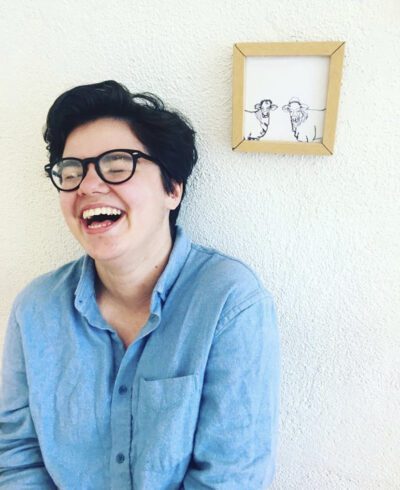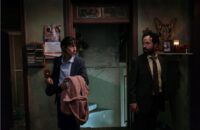Dillon Tucker is no stranger to being in front of the camera. He has been working as an actor in Los Angeles for over twenty years, but Pure O marks his feature directorial debut. For the film, Tucker dove in headfirst by wearing a multitude of different tasks for the project. He’s the writer, directors, editor, co-producer, and in charge of the music. While that might seem daunting for a first-time director, it feels right that Pure O is firmly sculpted by Tucker as it is his story.
Pure O is about Cooper (Daniel Dorr), a thirtysomething guy living in Los Angeles working as a counselor at a rehab center. He’s just proposed to his longtime girlfriend (Hope Lauren) and their relationship is stronger than ever. During a therapy session, Cooper is diagnosed with Pure Obsessional, a form of OCD that manifests in intrusive thoughts where the compulsions are entirely internal. As Cooper grapples with his new diagnosis, he leans on his friends, family, and community to understand how to fight through his darkness.
Tucker sat down with Film Obsessive’s Tina Kakadelis to discuss Pure O, his inspirations, and fighting the stigma of mental health in movies.
(The transcript has been edited for length and clarity.)
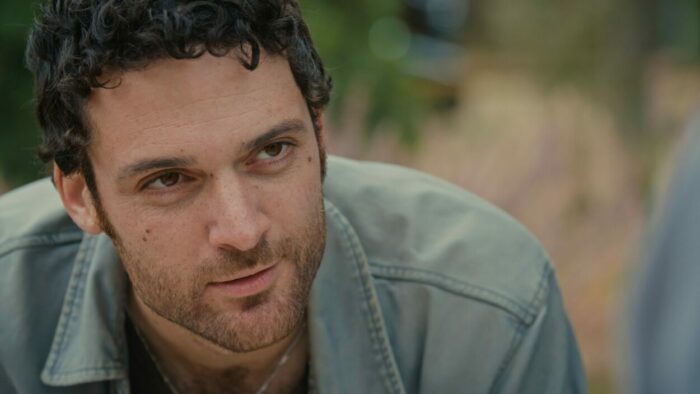
Film Obsessive: One of the reasons that I was very intrigued to watch Pure O is because you pointed to Mike Mills as one of your inspirations. It’s so rare that I get to see work where Mike Mills is listed as a direct inspiration. What draws you to his films? What about his style or his films in general did you want to emulate in the making of Pure O?
Dillon Tucker: Oh, gosh. Yeah. I’m glad you’re bringing that up. I love Mike Mills so much. I think C’mon C’mon is one of the best American films of the last ten years. Or just films, period. I love Beginners and 20th Century Women, too. That was just like a mantra as I was setting out to make [Pure O] because this is the first film that I’ve ever made that’s coming from an autobiographical place. Mike just does that better than anybody. It’s his aesthetic, his approach to filmmaking that I really tried to emulate for this particular project because I thought it was going to really serve the story I was trying to tell of my own self. Then also really empowering my actors to then take the torch for me and to bring as much of themselves as possible.
Obviously, stylistically I was going for a level of naturalism and realism. I also wanted such an emphasis on the writing and creating a first person narrative going through a phase of life, but also trying to find the the poetry within that journey. As I was writing the film, I was like, I just want this to feel like a kind of Mike Mills film. Also, having watched a lot of interviews and things like that with Mike, I knew that a lot of his influences are also already films that influenced me.
This was the question that I was saving for last, but it was it makes so much sense to bring up about when talking about Mike Mills because he’s all about vulnerability. One of the last lines in Pure O is, “I believe, vulnerability is the highest form of courage.” That was the nail on the head of, oh he loves Mike Mills like I love Mike Mills. What is it about vulnerability that you feel like is this strength when for so much of our lives we’ve been told to never let someone see us cry?
I mean, that’s just all a bunch of crap. The truth of it is it’s all about humans helping humans. I always reference I’m going to butcher it, but whatever. There’s the famous [Charles] Bukowski quote that goes, you really save the world one life at a time and everything else is just grandiose romance and politics. Especially in this day and age we live in with all the virtue signaling that people do on social media. If you really want to be about it, that means just being boots on the ground and helping people. Cooper, the main character [in Pure O], is working in rehabs and helping people while he’s also going through his own struggles. I think he’s a character that’s always been in a position where he’s helping others and now he’s in a position where he’s going through his darkest hour and he needs help. Now he’s getting help from the people that he’s supposed to be helping, but he’s almost getting more from them. That’s just true to life. We’re all suffering. We’re all going through our own shit and we need to have other humans that can help us along our journey.
That takes an incredible amount of vulnerability because people who white knuckle it, it just leaks out into their lives. We can’t hold these things in. It’s going to come out one way or the other. I think that it takes more courage to talk about something especially a film like mine that’s talking about OCD and suffering from intrusive thoughts dealing around really taboo issues. They suffer in silence because they don’t want to tell anybody close to them for fear of being judged. They don’t even want to tell a clinician or a therapist about it because they’re afraid they’re going to be institutionalized. So these people, these people who are suffering, myself included, you’re just feeling so isolated and so alone.
The trick to get better is to open yourself up and to be vulnerable. I truly believe that. I believe that foundationally and not in some sort of cheesy way. I think the more vulnerable you are in general in your life, that’s going to be very enriching.
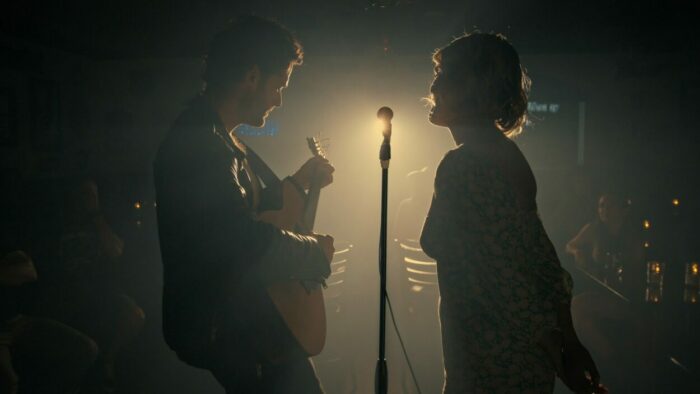
Like you mentioned, the film is partly autobiographical and you’re talking about or pure obsessional, which is a type of OCD that not a lot of people are very familiar with. Was there one misconception that you wanted to dispel or was there something that you just wanted to make sure that the film covered in a very non after school special way?
You hit the nail on the head. I mean, it was just necessary for a story like this because, even within the therapeutic community there’s misunderstanding about OCD. I knew that I was going to have to take the first part of the film to educate the audience. It works because the character himself is getting diagnosed at the onset of the film. He’s figuring it out and so is the audience. I just knew that I was going to have to put that into the film in order for everything else to work, for people to truly understand it because it isn’t just one misconception. It’s a litany of misconceptions around OCD and what it is.
People just think about OCD as the kitschy best friend and hand-washing and checking. That’s honestly just a micro percentage of what OCD sufferers really go through. Most of it is all mental and you actually have no physical compulsions. It’s all mental compulsions and things in your head revolving around themes. What OCD really looks like is something that needed to be laid out in order for the rest of the story to be, followed by the audience.
I wanted the film to work on two levels. I really wanted it to be an educational document that people could look at if they were either being diagnosed or if they had a loved one who was getting diagnosed. They’d be able to watch the film and be able to see an authentic depiction of what it might look like getting into recovery. I just wanted it to be entertaining. There’s a lot of other stuff that gets covered in the film outside of OCD like life issues that even if you’ve never had OCD or mental health issues, I think that there’s absolutely things in this film that you’ll be able to walk away from and connect to.
I want to ask about something that you mentioned. It’s like you said, this type of OCD is very internal. The compulsions are mental. When you were writing this script how did you overcome the barrier of taking something that is truly emotionally internal and show it in a visual medium?
That was the magic trick because obviously, it’s all in your head and it’s an invisible illness. I didn’t want to be kitschy about it and I didn’t want to do cutaways. There’s absolutely a version of this film to be made just cutting away to somebody’s head and showing what they were thinking, but I really wanted to ground the film in realism. I felt that the only way for an audience to really see an authentic depiction of what OCD looks like is to not leave the reality of the characters.
I didn’t want any magical realism. I didn’t want any sort of cinematic tricks. I wanted the film to be able to hold on the merits of its own story through the writing and the acting. It was just a creative decision that was made from the outset. As I was writing the film, I knew that that was the approach that I wanted to take with this one.
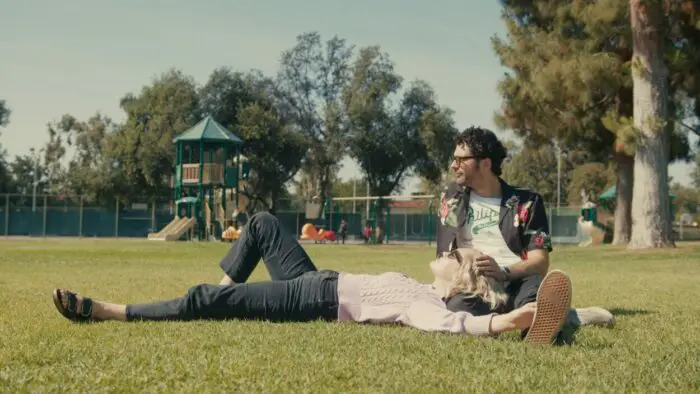
Going off your choice to highlight realism, you have actors, non-actors, and you have real life couples in the project. Why was that such an important decision for you?
I think it ties into what I was just speaking to of. I think that doing those sort of things and mixing in actors and non-actors, I think it just creates an enhanced sense of naturalism that I really wanted to go for. I wanted it to almost feel like documentary realism in a way. I wanted the film to feel like you were just putting a camera down in a room and watching somebody dealing with OCD hopefully in a very compelling and riveting way. Everything that we were doing creatively along the way, we were doing with that in mind.
The director of photography, Ricky Fosheim, he’s been, a friend of yours for decades and you guys have worked together a bunch of the past. So how did it feel to have a longtime friend as your partner in crime on your first feature debut?
It’s wonderful. We produced the film together as well. We’re old creative collaborators and old friends, so it’s always great when we work together. Ricky is just incredibly talented as an individual and he’s an incredible cinematographer. We had a lot of discussions going into pre-production about the arc of how we wanted to shoot this and everything that I’m talking about with you. He had amazing ideas that he added into that. Ricky’s wonderful with everything that he does.
This is your first feature and you are the director, writer, editor, producer and did the music as well. Was there ever a conversation that you had of maybe wanting to take something off your plate, maybe adding something onto your plate? What was that experience of jumping fully into these roles?
I mean, the discussion was I was going to star in the movie too, and then we had some we had a producing partner that fell off the project right before we were going into production. That kind of nixed that. I wasn’t going to be able to juggle that. That’s when we kind of pivoted.
A lot of that’s out of necessity. I mean, this is really indie indie filmmaking. A lot of it’s just the buck stops here and it stops with us. Something needs to be done and we don’t have any more money left for that, so who’s doing it? And it’s like, well, I guess I am. I know it sounds a little embarrassing when you list them all off like that.
No, it’s great!
It’s just it’s just out of necessity. and luckily, all the things that I took on are things that I have a genuine interest in and I love. I had edited some short form stuff, but I hadn’t edited a feature and I ended up loving that process. I feel like it’s just an extension of the writing process. I’m also a musician and I made the music for the film. I found editing to be this mixture of making music and writing, but with like finite possibilities. On a page, you can write anything, but once you get into the editing room, it’s an extension of the writer brain, in a way.
I’m just a creative person who really loves a lot of those mediums and stuff. I was just me and Ricky. Ricky wore a lot of hats, too, and a lot of stuff that we didn’t even take credit for. We didn’t want the whole film to be one of those movies where you’re watching the credits scroll and it’s just two people for like five minutes. It’s just indie filmmaking happening out of necessity.
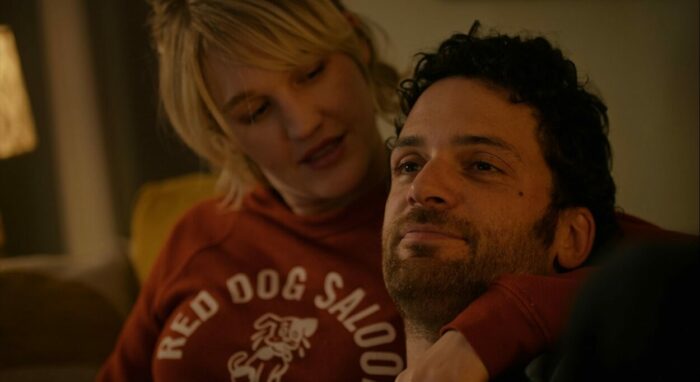
You talked a little bit about how the film is partially autobiographical. Was it ever hard to be essentially living through that time of your life again?
It had little moments, but for the most part, I really waited to make this film. It wasn’t a film that I was interested in making in the middle of everything. I wanted to make this film after I was through everything where I could really look at it from a retrospective, sort of like clear lens. Also, coupling back to what we’ve been talking about in this interview about Mike Mills and that approach of having it really not be my story.
I really meant that. I was like, listen, my story is on the page. I brought as much of myself as I could to the writing, but now this has to become fully fleshed and three dimensional. I have to bring in actors. Luckily, I had actors that were really game for the process of this film and I really, really encouraged them. The leads (Dorr & Lauren) are a real life couple. We had a lot of discussions around what things look like in your relationship. How do you guys fight? What are your intimate moments look like? What are your little pet nicknames for each other?
All of these little things like bringing in some of their real life stuff from their living space onto the set. We had to find that line together as a team of how much of yourself do you feel comfortable in using? I was pushing everybody to bring as much of themselves as they felt comfortable with. That also was just in the spirit of the project in terms of vulnerability.
By the time we got on set and we were filming, I truly didn’t feel like it was my story. I got to feel like I was actually watching other people bring their lives and marrying that with my story. I thought that all together that synergistically created a bit of a universality in the film.
My last question is about mental health in general and how it’s portrayed in pop culture. Why do you think it’s so difficult to portray mental health struggles realistically and honestly? Do you hope that people, after seeing Pure O, will learn from what you’ve made?
I think we’re just at an inflection point as a society with a lot of stuff where we’re finally coming out of the shadows and able to talk about mental health. It’s been here forever. It’s just that, for whatever reason, society, has been very toxic about coming out and talking about these things. We are just inherently judgmental as humans and the things that we don’t understand, we lash out against and have strong opinions about things that we don’t understand.
If there’s a conversation happening around an issue, it’s really rare for somebody to stop and say, you know what, I don’t really have enough information on this. Everybody barrels in and has opinions. Social media has just amplified that. I think that we are at a point now where depression and some other mental health issues are starting to become more normalized.
In the last couple of years, OCD, which is an anxiety disorder, I’ve really seen a ramp up in terms of people talking about it in the mainstream space. Some celebrities have been diagnosed and they’re talking about it. I mean, OCD wasn’t even in the DSM until like the 80s. Just the fact that we’re here, 40 years later, and there’s a different subset of it with mental compulsions.What I would just love is for people to have a genuine conversation because this is an incredibly debilitating illness that, people are shattered by.
As a society, we used to say, if you’re feeling scattered or something, somebody would say, you’re so schizophrenic. We still do that with OCD. Somebody who’s just particular gets a label as OCD and that’s not anything like what OCD is. I think the only way to change that narrative is through films and art and conversation and representation. I hope that Pure O can be part of that conversation and can lead people to hopefully be curious and represent things in a more authentic way.
Thank you so much, Dillon. The film’s very lovely and I really do hope that it helps start more conversations.
Tina, thank you so much for taking the time and using your platform to help elevate us. I appreciate you.

